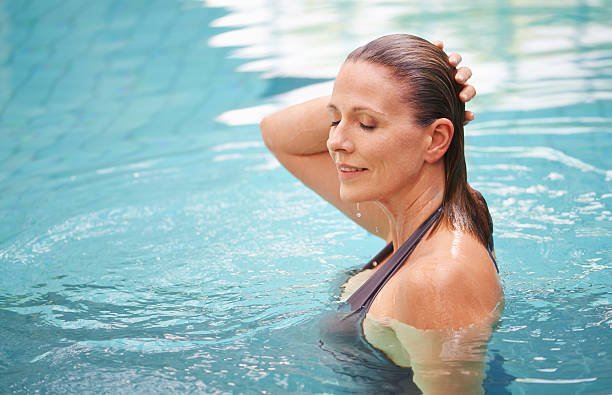Aging hits all of us eventually—sometimes slowly, sometimes all at once. One day you wake up with stiff joints. Your energy dips. You forget a name or walk into a room and can’t remember why. And while aging is natural, feeling older than you are doesn’t have to be.
In our last article, we shared the 7 powerful benefits of swimming for seniors—like better heart health, stronger muscles, and reduced joint pain. But what if I told you that swimming isn’t just good for your health… it’s also one of the best ways to stay youthful, inside and out?
Because here’s the truth: You don’t just want to be active—you want to feel like yourself again. Energized. Clear-minded. Confident in your body. Not weighed down by pain or fatigue. That’s where swimming comes in.
Let’s dive into the 7 deeply felt, youth-preserving benefits of swimming—and why the water might be the most graceful anti-aging tool you’ll ever try.
1. You Don’t Just Lose Muscle—You Lose Confidence

One of the hardest parts of aging isn’t just what changes on the outside—it’s what shifts inside. When your strength fades, so does your independence. You stop reaching for the high shelf. You hesitate before stepping off a curb. You start to feel… fragile.
But swimming brings that strength back—gently, gracefully. Every stroke, every kick, every glide through the water is a quiet act of rebuilding. It doesn’t just shape your muscles—it restores your sense of power.
Unlike lifting weights or pounding pavement, swimming makes you feel light, supported, and capable again. You move with intention. You move without pain. And with each swim, your posture improves, your core engages, and that quiet inner confidence starts returning. A simple pair of swim fins or aqua resistance gloves can gently help you build strength without strain.
“It’s not about chasing youth—it’s about protecting the parts of you that make you feel alive.”
2. Feel the Energy Come Back

You know that feeling when your body just… flows? Your heart beats steady, your limbs move with ease, and you’re not dragging through the day. That’s energy—not the kind from caffeine, but the kind that comes from within. The kind you used to have.
As we age, it’s easy to forget what that kind of natural energy feels like. Swimming helps bring it back.
Moving through water wakes up your body in a way that’s both calming and invigorating. Your breath deepens. Your blood flows more freely. You feel circulation turn into clarity.
Don’t underestimate the power of a comfortable pair of non-slip water shoes to help you walk tall into every swim.
“When I swim, I don’t feel older. I just feel alive.”
3. Emotional Youth Isn’t Vanity—It’s Vitality

Getting older doesn’t just change your body—it can change how you see yourself. You might stop recognizing the person in the mirror. You might feel invisible in rooms where you used to feel magnetic. Aging can quietly chip away at your identity, your presence, your spark.
But in the water, all of that fades. In the water, you’re weightless. You’re strong. You’re graceful. You’re you, again.
Swimming doesn’t care about your age, your wrinkles, or your mileage. It brings you back to the version of yourself that still moves with freedom and ease. The version that breathes deeply. The version that exists in the moment.
That emotional youth—the spark that says “I’m still here, I still have more to give”—it’s powerful. And it’s contagious.
When you feel alive, you connect more deeply with the people around you. Especially the little ones who look up to you. Swimming gives you a way to bond with your grandchildren—not just by watching from the sidelines, but by getting in the water with them, splashing, laughing, showing them that joy doesn’t have an age limit.
“When I swim, I remember the version of me they’ll want to know—not just the caretaker, but the spark, the light, the heart.”
4. Blue Mind: The Calm That Keeps You Centered

In a world that feels loud, fast, and often overwhelming, the pool is one of the last places you can go to truly be with yourself. No phone. No noise. Just your breath, your body, and the water.
This is where the idea of “Blue Mind” comes in—a term coined by marine biologist Dr. Wallace J. Nichols. It describes the deeply calming, almost meditative state that being in or near water creates. And if you’ve ever taken a deep breath while floating on your back or moved slowly through the water and felt your stress melt away—you’ve felt it.
Blue Mind quiets the nervous system. It helps you sleep better, think clearer, and let go of the stress you didn’t even realize you were carrying. And unlike mindfulness apps, this peace isn’t something you have to learn—it’s something your body remembers.
Even just wrapping up in a soft, quick-dry towel after your swim becomes a small act of self-care.
“The water has this way of reminding you how to breathe again. Not just with your lungs—but with your whole self.”
5. Move with Grace, Not Caution

One of the subtle ways aging shows up is in how we move through the world. We start to guard our steps. Our shoulders hunch forward. Our gait gets smaller. Without even realizing it, we begin to shrink ourselves to avoid discomfort or injury.
But swimming changes that.
In the water, your body is free to stretch, extend, and move fully without fear. You twist, reach, glide—lengthening your spine, opening your chest, unlocking tight hips. Using a kickboard or swim float belt can give you the freedom to stretch without fear of sinking.
And over time, that fluidity leaves the pool with you. You stand taller. You stop bracing for pain, and start moving like someone who trusts their body again.
“The way you carry yourself says more about your youth than the year on your birth certificate.”
6. Confidence That Comes From Within

There’s a kind of confidence that doesn’t come from how you look—but from how you feel. It’s the kind that shows up in your smile, your voice, your posture. The kind that says, “I’m still here. I still matter.”
Swimming helps you reconnect with that version of yourself.
It’s not about weight loss or looking younger. It’s about the way your body feels alive again. Strong again. Capable again. It’s about slipping into a swimsuit, walking to the edge of the pool, and saying, “Yes, this is for me too.” If a new supportive swimsuit helps you walk to the edge of the pool with confidence, then it’s worth every penny.
The more you swim, the more you start to see yourself differently—not as someone fading with age, but as someone stepping fully into this chapter with purpose, presence, and pride.
“You don’t need to reverse time to feel young—you just need to reconnect with what makes you feel powerful.”
🌟 7. Keeps You Curious and Adventurous

Staying young isn’t just about how you move—it’s about how you live. And one of the most overlooked parts of aging well is keeping your curiosity alive.
Swimming brings that spark back. Whether it’s learning a new stroke, exploring a different pool, or playing with your grandkids in the shallow end, the water invites presence, spontaneity, and joy.
When you’re in the pool, there’s no rush. No deadlines. Just the gentle reminder that life can still be playful, fluid, and full of possibility. That spirit of adventure doesn’t fade with age—it just needs to be nurtured.
“Swimming reminds you that there’s still so much to explore—both around you and within you.”
You stop shrinking away from new experiences—and start stepping into them with wide eyes and an open heart.
FAQ: How Swimming Keeps You Young
Does swimming really slow down aging?
While swimming can’t stop time, it can absolutely slow the effects of aging—both physically and emotionally. It helps preserve lean muscle, supports heart and brain health, improves balance, and relieves stress. These are all key to aging gracefully and feeling vibrant as you get older.
Why does swimming make me feel younger?
Swimming connects you to your body in a way that’s gentle, graceful, and empowering. The water supports your movement, quiets your mind, and helps you feel strong without pain. Many people say they feel mentally clearer, physically lighter, and emotionally centered after a swim.
Can swimming improve memory and brain health?
Yes. Regular swimming increases blood flow to the brain, which is linked to better memory, sharper thinking, and lower risk of cognitive decline. It’s also one of the few exercises that engages breath, body, and rhythm all at once—an ideal combination for staying mentally sharp.
Is swimming good for posture and mobility as I age?
Absolutely. Swimming gently stretches and strengthens your spine, shoulders, and hips—helping you stand taller and move with confidence. Unlike weight training, it improves flexibility without compressing your joints.
Can swimming help me feel more connected to my grandchildren?
Yes. Swimming isn’t just exercise—it’s a shared experience. Whether you’re splashing together, floating in the shallow end, or just watching them play from the water, it keeps you present, playful, and engaged. That emotional connection is one of the greatest anti-aging benefits of all.
What if I haven’t swum in years? Is it too late to start?
It’s never too late. Swimming is one of the most beginner-friendly, forgiving forms of movement available. You can start slow—water walking, floating, or joining a senior-friendly class—and build from there. The water meets you where you are.
Can swimming make you look younger?
Yes—indirectly. While swimming won’t erase wrinkles, it can help you carry yourself with more grace and confidence, which many people associate with looking younger. Improved posture, toned muscles, and better skin circulation can all contribute to a more vibrant, youthful appearance.
Does swimming help with anti-aging?
Swimming supports anti-aging from multiple angles: it preserves muscle mass, promotes brain health, reduces stress, and enhances flexibility. It’s a powerful habit for staying emotionally resilient, physically strong, and mentally sharp as you age.
What is the 80/20 rule in swimming?
The 80/20 rule means that roughly 80% of your swim time should be slow, relaxed movement, and only 20% should be more intense or effort-based. This keeps your body in a sustainable rhythm and aligns beautifully with Zone 2 cardio, which supports fat burning and longevity.
Does swimming improve longevity?
Studies suggest that people who swim regularly tend to live longer, healthier lives. That’s likely due to a combination of low-impact movement, improved cardiovascular function, stress relief, and emotional well-being. Swimming is one of the few exercises that checks every longevity box—gently.
Conclusion: Stay in the Water, Stay in Motion, Stay You
You don’t have to chase youth. But you can absolutely protect the parts of you that matter most: your spark, your strength, your presence. Stay younger for longer.
Swimming isn’t just movement. Swimming keeps you young! It’s restoration. It’s self-respect. It’s a return to clarity, confidence, and grace.
Action Creates Greatness.
Try one swim session this week. You don’t need to be fast—just consistent.
Your future self will thank you.
“Disclaimer: This post contains affiliate links. If you make a purchase through one of these links, I may earn a small commission at no additional cost to you. As an Amazon Associate, I earn from qualifying purchases. Your support helps keep this site running and allows me to continue providing valuable content.”


